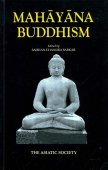Mahavastu, Mahāvastu, Maha-vastu: 5 definitions
Introduction:
Mahavastu means something in Buddhism, Pali, Hinduism, Sanskrit. If you want to know the exact meaning, history, etymology or English translation of this term then check out the descriptions on this page. Add your comment or reference to a book if you want to contribute to this summary article.
In Buddhism
Mahayana (major branch of Buddhism)
Source: Wikipedia: LokottaravādaMahāvastu (महावस्तु) (Sanskrit for “Great Event” or “Great Story”) is a text of the Lokottaravāda school of Early Buddhism. It describes itself as being a historical preface to the Buddhist monastic codes (vinaya). Over half of the text is composed of Jātaka and Avadāna tales, accounts of the earlier lives of the Buddha and other Bodhisattvas.
The Mahāvastu is considered a primary source for the notion of a transcendent (lokottara) Buddha, common to all Mahāsāṃghika schools. According to the Mahāvastu, over the course of many lives, the once-human-born Buddha developed supramundane abilities including: a painless birth conceived without intercourse; no need for sleep, food, medicine or bathing although engaging in such “in conformity with the world”; omniscience; and, the ability to “suppress karma”

Mahayana (महायान, mahāyāna) is a major branch of Buddhism focusing on the path of a Bodhisattva (spiritual aspirants/ enlightened beings). Extant literature is vast and primarely composed in the Sanskrit language. There are many sūtras of which some of the earliest are the various Prajñāpāramitā sūtras.
Languages of India and abroad
Sanskrit dictionary
Source: Cologne Digital Sanskrit Dictionaries: Edgerton Buddhist Hybrid Sanskrit DictionaryMahāvastu (महावस्तु).—name of the work (Mahāvastu): Mahāvastu i.1.2; colophon i.4.11; glorification of it, iii.250.10 (and ff.).
Source: Cologne Digital Sanskrit Dictionaries: Monier-Williams Sanskrit-English Dictionary1) Mahāvastu (महावस्तु):—[=mahā-vastu] [from mahā > mah] n. Name of a non-canonical work of northern Buddhism, [Monier-Williams’ Buddhism 70.]
2) Mahāvāstu (महावास्तु):—[=mahā-vāstu] [from mahā > mah] n. gr° space, [Bhāvaprakāśa]
3) [v.s. ...] mfn. occupying gr° sp°, [ib.]
[Sanskrit to German]
Sanskrit, also spelled संस्कृतम् (saṃskṛtam), is an ancient language of India commonly seen as the grandmother of the Indo-European language family (even English!). Closely allied with Prakrit and Pali, Sanskrit is more exhaustive in both grammar and terms and has the most extensive collection of literature in the world, greatly surpassing its sister-languages Greek and Latin.
See also (Relevant definitions)
Full-text (+4969): Pundarikaksha, Sarvabandha, Vigatareṇu, Manushyanaga, Carugandha, Vishalaprabha, Pushpamanjarimandita, Bhumideva, Janutrasta, Bandhanantakara, Upacitahanu, Naradeva, Sushoma, Kamalaksha, Pundarikanetra, Danapraguru, Rajahamsagamin, Prasannabuddhi, Padmarajavarna, Supratishthitabuddhi.
Relevant text
Search found 22 books and stories containing Mahavastu, Mahāvastu, Maha-vastu, Mahā-vastu, Mahāvāstu, Mahā-vāstu; (plurals include: Mahavastus, Mahāvastus, vastus, Mahāvāstus, vāstus). You can also click to the full overview containing English textual excerpts. Below are direct links for the most relevant articles:
Amaravati Art in the Context of Andhra Archaeology (by Sreyashi Ray chowdhuri)
Nāga Muchalinda Episode < [Chapter 3 - Amarāvatī and the Formative Stage of the Buddhist Art]
The Birth of Buddha < [Chapter 3 - Amarāvatī and the Formative Stage of the Buddhist Art]
Offering of food by Trapusa and Bhallika < [Chapter 3 - Amarāvatī and the Formative Stage of the Buddhist Art]
The Mahavastu (great story) (by J. J. Jones)
Foreword to the first volume < [Volume I]
Foreword to the second volume < [Volume II]
Foreword to the third volume < [Volume III]
Maha Prajnaparamita Sastra (by Gelongma Karma Migme Chödrön)
Appendix 5 - The story of the bhikṣu Kṣānti < [Chapter VIII - The Bodhisattvas]
Appendix 6 - The 57 days between Buddha’s enlightenment and his first sermon < [Chapter XIII - The Buddha-fields]
Appendix 2 - The legend of Dharmaruci < [Chapter XIII - The Buddha-fields]
The Fo-Sho-Hing-Tsan-King (A Life of Buddha) (by Samuel Beal)
Lives of Buddha (13): Fo-shwo-cung-hu-mo-ho-ti-king < [Introduction]
Sripura (Archaeological Survey) (by Bikash Chandra Pradhan)
Scultures of Avalokitesvara < [Chapter 3 - Sculptural Programme]
Stupas in Orissa (Study) (by Meenakshi Chauley)
Symbolism of the Stupa < [Chapter 3]
History of Buddhism from Buddha’s times to the third Century BCE < [Chapter 2]
Evolution of Stupa as seen from Archaeological remains < [Chapter 3]
Related products
